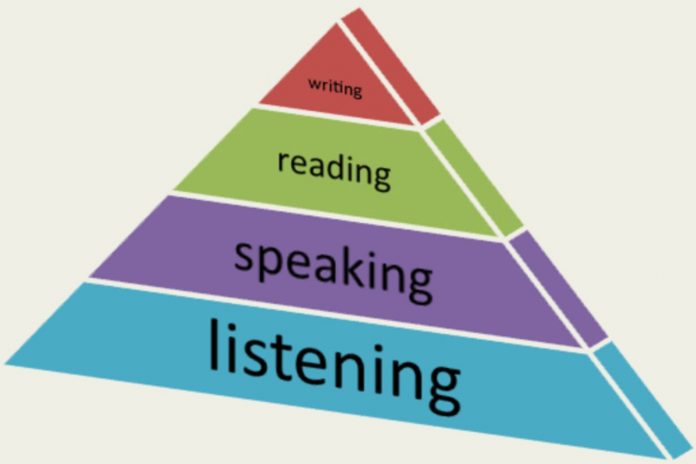Can our students progress in acquiring a foreign language without developing strong listening comprehension skills? Can two people communicate orally if one of them is not able to understand what is being said? Listening is the main door for learning. As Rivers (1981) pointed out, in normal life we can expect to listen twice as much as we speak, four times more than we read, and five times more than we write. However, how much time do we allow in our lessons to develop in our students this important skill? Usually, it is assumed that teacher talk will be enough to develop in our learners listening abilities but, is it enough?
Let’s consider some techniques that have been proved to be effective in developing listening comprehension skills:
1.Go beyond the overused technique of listening for the gist or to get the main idea. Try out other activities such as note taking, clue searching, paraphrasing, inferential listening, or graphic fill-ins.
2.Consider that each level i.e. Elementary, Intermediate, Advanced has its own set of activities each one much more interesting than listening to get main ideas. Thus, while Elementary students can do selective listening or listening with visuals, Intermediate students can enjoy other activities such as inferential listening or story rebuilding.
3.Promote the development of different skills, especially those that will have a positive impact on the students’ communicative competence such as distinguishing word boundaries, recognition of stress and rhythmic patterns, recognition of cohesive devices or even retaining short phrases that have been said.
4.Activate the students’ background knowledgeof the topic presented in the listening activity. A very effective way to activate their previous knowledge of the topic to be heard in your students is by asking them to predict what is going to be said. Also, check if your students have the knowledge which is prerequisite to understand the text presented. Consider that there is a relationship between background knowledge and command of the language: a good command of the language will free the student to rely on pre-existing knowledge of the topic to understand an oral message.
Remember that if you ask your students to listen to a text whose context is unknown for them, they will struggle too much with the task and will end up demotivated.
5.Bring the real world to your classroom by using authentic materials. Nowadays there is plenty of listening materials that will make your lessons more lively and motivating. Use extracts of movies, TV sitcoms, songs, etc. You do not need to adapt them according to your students’ level, just control the task that they will perform with that material.
6.Do not expose your students to uncomfortable situations during listening comprehension activities. You want them to feel successful and enjoy their learning experience. Some teachers like to call on to individual students to provide the answers after a listening activity. This is not too helpful. It’s much better to ask them to compare their answers in pairs, and before listening to the text a second time, write their doubts on the blackboard. Thus, you will be doing two good things: your students will be listening again with a specific objective instead of a boring “listen again” and you will be preventing those possible frustration feelings from part of the students that did not get the right answer.
Now your turn:
What do you usually do to enhance your students’ listening skills? How would you rate your techniques?
Let us know by dropping a few lines sharing your experience with us and our readers!
References
Source: Teaching Language in Context
Alice C. Omaggio
Estimated reading time: 3 minutes, 0 seconds










